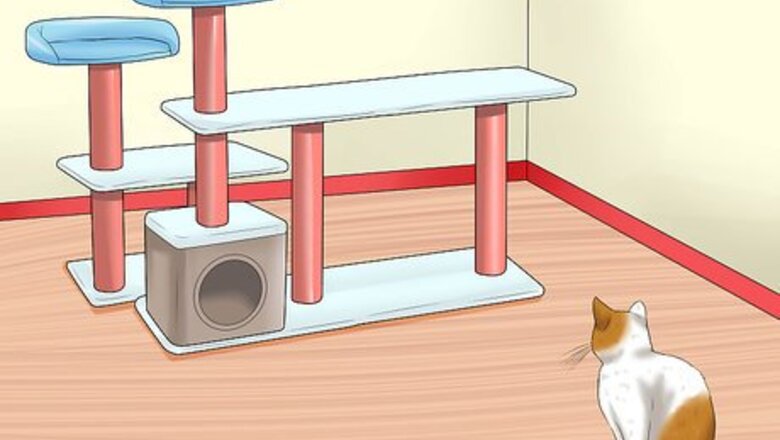
views
Keeping Your Cat Safe

Create a cat-safe environment. An indoor cat get makes its own amusement, which often means exploring the home and playing with anything that catches its eye. It is important you check around your house from a "cat's eye" point of view and look for things it might hurt itself on and make sure they are safe. Be aware cats may jump up onto all kinds of surfaces. Just because a surface is waist-height, or even head-height, doesn't mean that your cat won't thoroughly explore it. Put away things what will be attractive to a cat. For example, tinsel, shoelaces, wool, string, sewing supplies are all attractive to cats. If it's long, thin, and snake like then the cat will want to play with it. Make sure these are all tidied away because if the cat investigates with its mouth and swallow a piece of wool the cat could end up with a serious bowel obstruction that requires surgery to correct it. Cats and candles don't mix. Cats love to jump up, so even putting a candle on a high shelf doesn't mean it's safe. In the worst case scenario, the cat won't know it's there, knock it over, and cause a house fire.
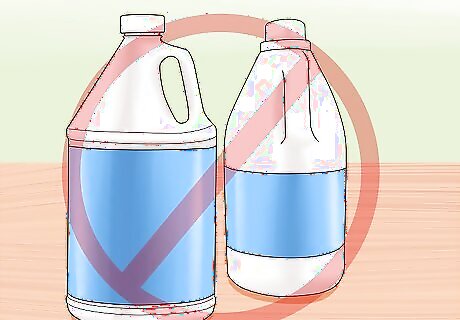
Keep toxins out of reach of your cat. Always make sure cleaning agents and other chemicals are locked out of harm's way. There are many chemicals we use in our homes that are severely toxic to cats. For example, many common floor cleaners contain benzalkonium chloride. This chemical can cause burns to delicate tissue, such as the tongue or the lining of the mouth of a cat. If a cat walks across a floor still wet with cleaner, and then licks its paws to clean them, it could develop nasty tongue ulcers which prevent it from eating.

Find out if your house plants could be toxic to your cat. Many house plants are toxic or potentially fatal to cats. Indeed lilies have no place in a cat household, since the pollen is extremely toxic and causes severe kidney failure. Other plants to avoid include azaleas, hydrangeas, poinsettias, daffodils, and mistletoe. This is not an exhaustive list so always check to see if your plants are feline friendly before bringing them into your house.
Providing For Your Cat's Basic Needs

Provide a litter box for your cat, which you should clean daily. Cats like privacy when on the toilet. Place the tray in a quiet area where the cat won't be disturbed or frightened by a sudden noise (such as a washing machine in a laundry room). If you have several cats, be aware that you need one tray for each cat. Its even a good idea to have a spare. Thus if you have five cats you should have six trays. Keep the trays clean so they are pleasant places for your kitty to visit. This means daily pooper scooping and spot cleaning, and a weekly complete clean of the trays.
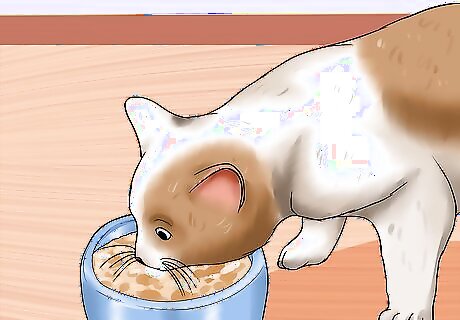
Give food and water. Be aware that indoor cats are prone to weight gain. To prevent this, measure out the food and give the amount recommended on the package. If your cat is putting weight on (its ribs get more difficult to find), then reduce its daily allowance. Keep fresh water on hand at ALL TIMES! This is very important. Consider feeding foods made for "indoor" or "sterilized" cats, since these are slightly reduced in calories to take account of the cat's lifestyle. It is a good idea to give the cat an outlet for hunting behavior by using puzzle feeders so kitty works for its supper. These are available online and through most pet stores.
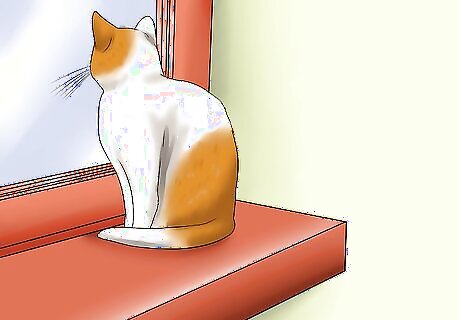
Give your cat its own special place to get some alone time. It's important that the cat has a little space of its own, even if it actually sleeps with you at night. This little space could be a cat bed, or a cat tree that the cat can curl up inside of.
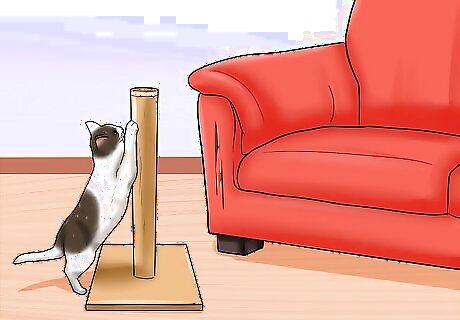
Provide a scratching post for your cat. Scratching is a part of normal cat behavior. When it scratches the cat deposits tiny amounts of scent, which lets other cats know it has claimed the territory. If you don't provide a scratching post then the cat will find its own and it could very well be your best sofa. Watch your cat to see if it scratches horizontally (along the carpet) or vertically (up the sofa). Provide your cat with a scratch post that is either flat (horizontal) or vertical to match its natural scratching preference. Make sure the post is taller than the cat is and anchor it firmly, so it doesn't move when the cat scratches. Place the post near an entrance or exit, since this is where cats like to deposit their scent. Also put a post near the cat's bed, since cats like to scratch when they get up after sleeping.
Giving Your Cat Mental Stimulation and Exercise
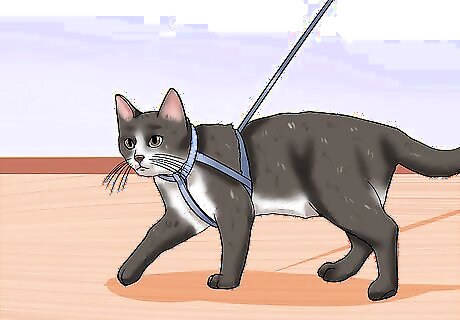
Ensure that your cat gets adequate exercise. Play with your cat regularly. Make sure you have regular play sessions, several times a day. Cats are sprinters rather than marathon runners so three or four, 5 - 10 minute sessions are better than a one-time 20 minute session of play. Get a little feather wand, some toy mice, or even just a piece of string (they never get tired of it). Shake the wand around at the cat's height, not yours. Throw the mouse and watch the cat wrestle with it. Hold one end of the string and either run around the house with it, or just wriggle it around.

Don't assume that your cat doesn't want to play, just cause it also enjoys napping. Cats are hunters, which means that they have periods of inactivity interspersed with hunting activity. Because cats like to sleep that doesn't mean that they don't need the mental stimulation with scenting out a mouse, stalking, and catching it would provide. Many behavioral issues such as house spraying, scratching, or aggression to other pets are caused because of boredom or frustration. So be sure to provide plenty of interesting things for your cat to play with.
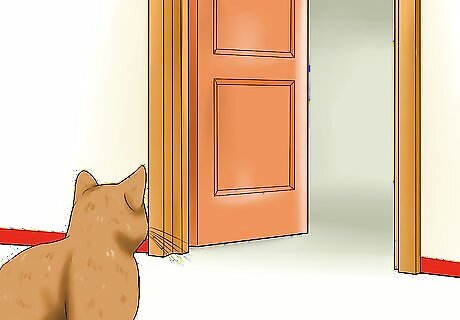
Give your cat a view of the outside. Make sure it has a high perch with a window view. This allows the cat to be entertained by the sights outdoors and to fulfill the feline need to be high up, as cats are naturally tree climbers. If you live in an apartment make sure the balcony is cat safe and the cat cannot fall from a balcony rail. You may consider caging in an area of the balcony so the cat can lookout over the neighborhood but without the risk of injury. Likewise, make sure any opened windows are escape proof. Check screens to make sure they are secure and not damaged, so the cat cannot slip out when you're not looking.

Bond with your cat by training it. It's not only dogs that benefit from obedience training. Try clicker training your cat, which provides vital mental stimulation for your feline friend, and also helps it to bond with you. This training is done in a similar way to dogs, but just be patient with the cat and be aware you need to find a treat that really motivates the cat to follow commands.

Give your cat things to occupy its mind while you are gone. Leave out toys for your cat to play with when it isn't able to play with you. You could leave out toy mice or catnip, but you can also leave out items that are less expected, but safe for your cat. Try putting out a paper bag or a cardboard box for your cat to explore and play with.

Enjoy time with your cat! Give it lots of love and attention, if your cats desires it. You have about 20 years ahead of you with your cat, so make the best of it by building a bond of mutual affection.
Taking Care of the Health of Your Cat
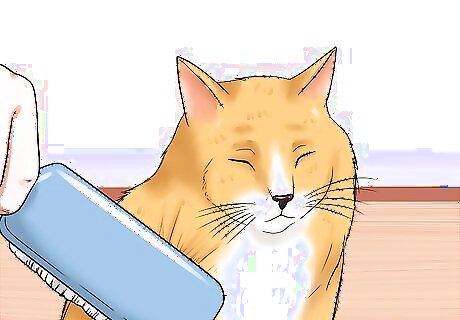
Groom your cat occasionally. Indoor cats need their nails clipping more frequently, as they are not wearing them down going outside. Either have your vet tech or cat groomer cut them, or ask them to show you how to do it. Clip the tips once a month. Also brush your cat wherever it lets you. It may even roll around and let you brush its furry stomach if it's in a really affectionate mood! Brushing your cat is not usually necessary to keeping your cat's coat in good condition (cats usually groom themselves) but it is a good way to form a bond with your pet. This is also a chance for you to inspect your cat's coat and its body for potential health issues. Look for black dots or things moving in the cat's fur. Separate the fur and look at the exposed skin. If you do see things moving or lots of small black dots (flea feces), get it a flea and tick collar, a spray, powder, or take the cat to the vet to get suggestions about treatment. Sometimes as cats get older they are no longer able to groom their coats completely. They loose flexibility, making it impossible for them to reach their entire coat. If this is the case with your cat, you may need to do more regular grooming to keep your cat's coat healthy.

neuter your indoor cat. Unneutered animals are much more territorial and likely to mark their territory (your home!) with urine or feces. Also, they are more likely to attract strays to the house, which in turn can leave your cat feeling threatened or distressed by the sight of other cats in its yard.

Get your cat vaccinated. Even though the cat doesn't go out, you should still get it vaccinated. Some viral infections, such as feline distemper, are caused by hardy viruses that can be walked in on your shoes. Also, if your cat does slip out one dark night, because its immune system has never been exposed to outdoor bugs, there is a greater risk of it catching disease. Cats that don't hunt or go outdoors still require worming twice a year. This is because they are born with worms that they acquired from their mother, and the worm eggs lay dormant in the body tissues which hatch out over the pet's lifetime.

Don't forget flea control. While the risk of acquiring fleas is lower with an indoor cat, if your pet does pick up a flea than you are liable to have a population explosion. There are many excellent safe and effective flea products for use on a cat. Have a chat with your veterinarian to discover which is the best product to meet your needs and your cat's needs.

Get your cat micro-chipped. This is a small microchip that is implanted under the skin of the scruff. When the chip is scanned it sends out a unique number that is registered on a data base with your details. Should your cat escape, the chip provides a foolproof way of the rescuer realizing it is owned and reuniting the two of you.


















Comments
0 comment